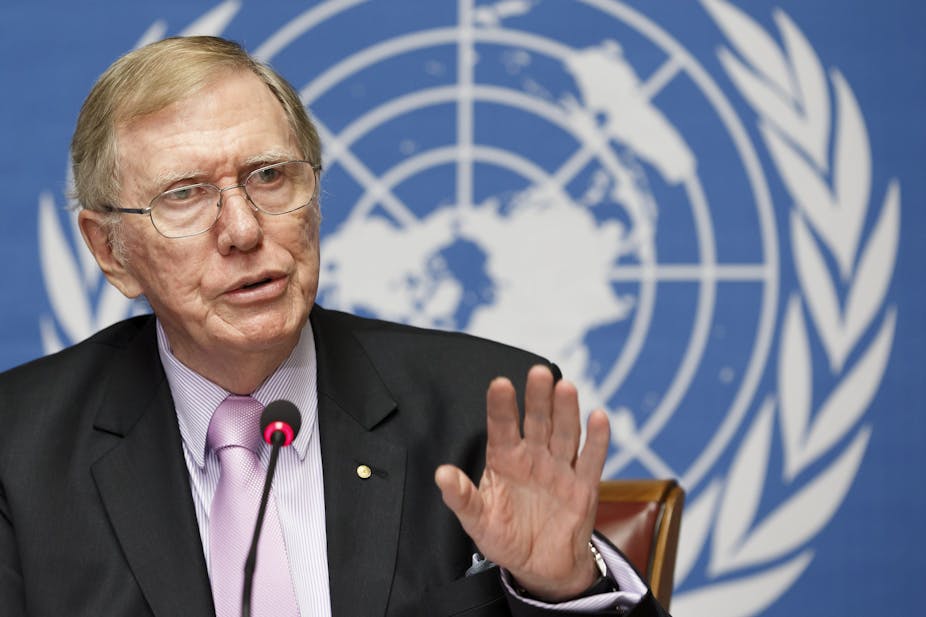Watch the Honourable Michael Kirby, visiting professorial fellow at UNSW Australia, talk about how the law impacts HIV below.
Michael Kirby is a former justice of the High Court of Australia, serving from 1996 to 2009 and a former member of the Global Commission on HIV and the law.
He spoke to us at the AIDS2014 Conference in Melbourne about the many ways in which the law affects the spread of HIV by marginalising men who have sex with men, sex workers, injecting drug users, prisoners and refugees. And about how we need to change international intellectual property law if we are to get ahead in public health.
Transcript: The law can be a guardian of people who are vulnerable and who are sick, but the law can also be an awful nuisance in this area of HIV and AIDS.
And in the past, I have served in a number bodies – most recently the Global Commission on HIV and the Law – looking at the way in which the law is an impediment to successful strategies.
That report was basically dealing with two areas: the first was the law and vulnerable groups, often the law is the cause of vulnerability. I’m thinking, for example, the laws against men who have sex with men - gay men, the laws that deal with prisoners, the laws that deal with refugee applicants, the laws that deal with sex workers - prostitutes, the laws that deal with injecting drug users.
In these areas, law can be a burden on the person and their freedom, on their ability to see the importance of getting the HIV test, and getting onto antiretroviral drugs if they turn out to be positive. So that’s the first category of the report.
The second was dealing with an area that sounds boring, but is actually very important, and that is intellectual property law, patent law. The law that protects authors and inventors to their inventions, especially pharmaceutical inventions.
And whilst there need to be protections of the rights of inventors of new drugs, some of these protections are, at the moment, disproportionate – both to the needs of invention and to the rewards that should go. And too costly for people, especially in developing countries.
One of the areas that’s been brought out in the Melbourne conference has been in respect of one of the so-called co-infections – the co-infections dealing with hepatitis.
There are a number of hepatitis varieties, but two of them - hepatitis B and hepatitis C - are quite common infections. In fact, there are millions of people with these infections.
And just taking hepatitis C, there is a course of therapy which can effectively cure a person of hepatitis C. Hepatitis C, in many many cases, goes on to cause cirrhosis or the liver and also it causes cancer, and it’s a very bad condition, and it’s contagious. It’s a spreading condition.
Unfortunately, the drugs given in those cases are extremely costly, because of the costs that are imposed by the patent holder, Gilead Pharmaceuticals.
In the United States, if you want the 12-week course that will cure you, you have to pay $84,000 for the whole course. In Australia, I assume it must be roughly the same.
The patent owner has made it available in India for $2,000 - 84 to two - and they’ve made it available in Egypt where there’s a very big hepatitis C infection, for $800.
It costs $84 approximately to make the drugs, so we’re talking about drugs that cost $84 for $84,000, and it’s disproportionate to the inventiveness to require people to pay that amount. And, of course, it puts it completely out of the possibility for people in many developing countries.
I think it’s a long-term issue for HIV and AIDS, and also for pharmaceutical products generally, and perhaps for other areas of patent law.
It’s a long-term issue because, at the moment, the law on this subject is stated in the so-called TRIPS agreement - the Trade and Related Intellectual Property law of the World Trade Organization.
And that agreement is basically in the hands of a body - the World Trade Organisation - which is not a United Nations agency; it’s essentially a cartel of the countries, many of them with intellectual property to protect.
And the law in this subject has developed without due respect for the fundamental human right to access to essential health care.
And what is needed, as the Global Commission on HIV and the Law pointed out, is a new inquiry at international level – inaugurated by the secretary-general of the United Nations – to investigate a reconciliation between the right to health and the right of authors to proper protection for their inventions.
At the moment, all the eggs are in the basket of the authors, and it’s not really a proportionate balance. And that’s why the Global Commission suggested that there should be a high level of investigation.
That is being considered at the moment by the Secretary-General of the United Nations Ban-Ki-Moon, and I am still hopeful that Secretary-General Ban, who has been such a wonderful leader in issues of HIV and sexuality, will sign off on this and get the high-level investigation to proceed.
But, of course, it will have some pretty powerful enemies and we’ve still got to wait - you’ve just got to watch this space.
Special thanks to RMIT University for its assistance in the production of this video.

